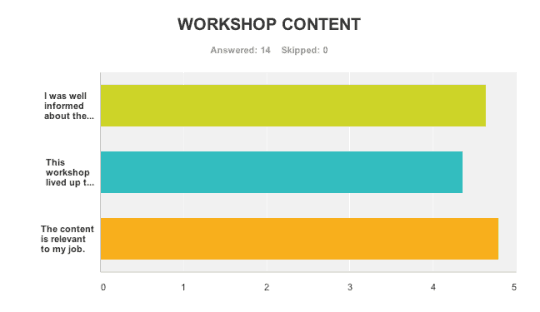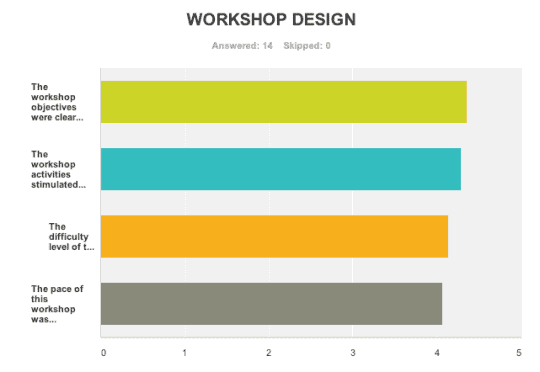I'm part of the crowd that asks the following of healthcare organizations and leaders: be transparent and share quality data with the public, be open about problems and realize that “no problems is a problem,” and practice continuous improvement in all they do.
My Healthcare Kaizen co-author Joe Swartz and I recently did a workshop in Detroit that went pretty well. But, that's like believing a hospital say they are “a leading such and such” or “world class something or other.” Joe and I really try to practice what we preach, as we demonstrated with a small Kaizen related to our workshop prep.
Now that the workshop is done, thank you messages have been sent and received, surveys have been sent and filled out, and Joe and I have things to improve for next time and for my future workshops, including those coming up in March with Jim Benson.
The first three questions we asked attendees (n=14 of 24 attendees, where 5 is the highest score):
- I was well informed about the objectives of this workshop.
- This workshop lived up to my expectations.
- The content is relevant to my job.

The next questions were:
- The workshop objectives were clear to me.
- The workshop activities stimulated my learning.
- The difficulty level of this workshop was appropriate.
- The pace of this workshop was appropriate.

As I shared with the attendees via email….
Joe and I each had facilitator scores of roughly 4.5 and we thank you for the feedback about what we can do better. We appreciate the thumbs up and pats on the back.
While I think the workshop is a good starting point, here is our summary and framing a few things we can do better based on your feedback. Note we have multiple ideas for some of these problems/opportunities and will experiment with these in the future. Some are clearly “just do its” and some require some more thought.
Problem: Some content too basic for experienced practitioners
- Idea: Possibly reframe the class as being “introductory” and make that more clear
- Idea: We can do a follow up webinar with some “advanced topics” if you like — please reply to this email to send me questions or topics that you'd like covered in a webinar
Problem: Content not a great fit for all attendees
- Idea: Do a survey in advance of the class to gauge experience levels and what things people specifically want to learn
Problem: Simulation was not necessarily framed well in the context of Kaizen
- Idea: I have a bit too much variation in how I facilitate this. There were some key points that I didn't make for some reason. I can give myself better scripting for facilitation points that I should make.
- Idea: Spend less time on introductory slides and do more “teaching by doing” in the context of a better facilitated exercise
- Idea: Kill the exercise all together
Problem: Not enough time spent on leadership and coaching (for advanced practitioners)
- Idea: Spend more time on this
- Idea: Do a separate “advanced” Kaizen workshop
Problem: Lack of diversity in some quotes / slides (lack of women)
- Idea: While most of the kaizen ideas came from women, we could use more quotes from women we have worked with or take the other suggestion that fewer quotes be used and rely more on the facilitators' personal experience..
Joe and I are happy with the workshop and proud of what we're trying to do. That said, we can ALWAYS do things better and that's what we are committed to doing.
What do you think? Please scroll down (or click) to post a comment. Or please share the post with your thoughts on LinkedIn – and follow me or connect with me there.
Did you like this post? Make sure you don't miss a post or podcast — Subscribe to get notified about posts via email daily or weekly.
Check out my latest book, The Mistakes That Make Us: Cultivating a Culture of Learning and Innovation:








